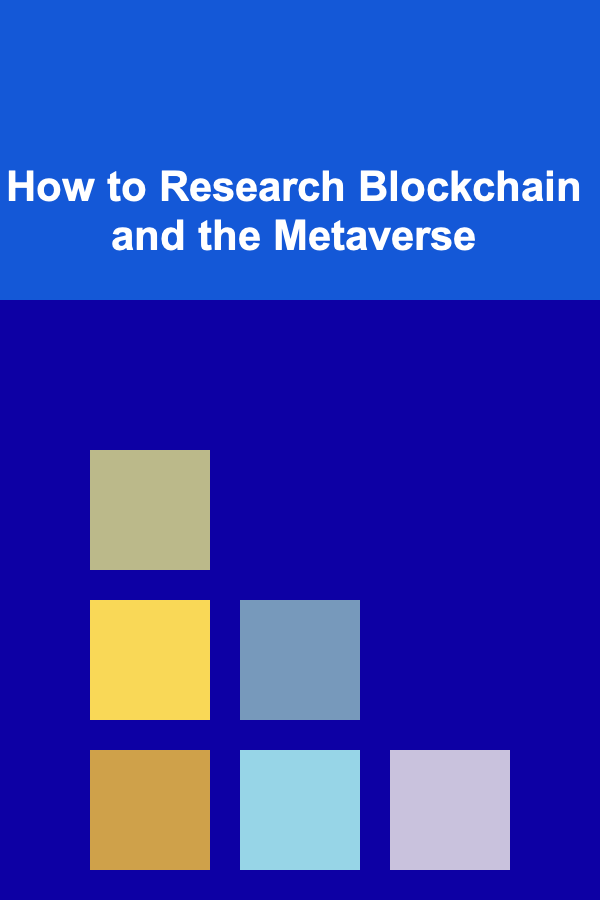
How to Research Blockchain and the Metaverse
ebook include PDF & Audio bundle (Micro Guide)
$12.99$9.99
Limited Time Offer! Order within the next:

Blockchain and the Metaverse are two transformative technologies that have captured the imagination of developers, investors, and innovators around the world. Blockchain, with its decentralized ledger system, promises to revolutionize everything from finance to supply chain management, while the Metaverse---a collective virtual shared space---has the potential to redefine how people interact, socialize, and conduct business online. As these technologies continue to evolve rapidly, understanding how to research them effectively is crucial for anyone wanting to engage with them, whether for academic purposes, investment opportunities, or technological innovation.
In this article, we will explore how to research blockchain and the Metaverse. We will discuss the methodologies and tools necessary to study these technologies in-depth, the various resources available for gaining expertise, and strategies for staying up to date with the latest developments in these fields.
Understanding Blockchain and the Metaverse
Before diving into the specifics of how to research blockchain and the Metaverse, it's important to have a solid understanding of what these technologies are.
Blockchain
Blockchain is a distributed database or ledger that records transactions across multiple computers in such a way that the registered transactions cannot be altered retroactively. Its most well-known application is in cryptocurrency, but it has broader implications in fields like supply chain, digital identity management, healthcare, and voting systems. The technology's core features---decentralization, transparency, and immutability---set it apart from traditional centralized databases.
The blockchain operates through a network of nodes (computers) that validate and store data in blocks, which are then chained together in a secure and chronological order. Each block contains a cryptographic hash of the previous block, a timestamp, and transaction data. This makes it extremely resistant to fraud and tampering.
The Metaverse
The Metaverse is often described as the next iteration of the internet---a virtual, shared, and immersive environment that integrates augmented reality (AR), virtual reality (VR), and other digital experiences. In the Metaverse, people can interact with one another, digital objects, and environments in real-time. The Metaverse is not confined to one platform but is envisioned as a collection of interconnected virtual spaces, each offering different experiences and functionalities, such as gaming, socializing, work, and commerce.
The concept of the Metaverse is still evolving, but it has already begun to gain traction in industries like gaming (e.g., Fortnite, Roblox), virtual real estate, and online collaboration tools. The technology is powered by a combination of blockchain, 3D rendering, and immersive experiences facilitated by VR and AR.
Researching Blockchain
Researching blockchain requires a systematic approach, given its technical complexity and fast-moving nature. Below are key steps you can take to begin researching blockchain effectively.
1. Start with the Basics
Before diving into the intricacies of blockchain, it's important to start with the foundational knowledge. This includes understanding the key concepts and components that make blockchain work. Some fundamental areas of study include:
- Cryptography: Understanding how cryptographic techniques like hashing, public-key cryptography, and digital signatures work is essential for grasping the security features of blockchain.
- Consensus Mechanisms: Study the different consensus algorithms that blockchains use to verify transactions, such as Proof of Work (PoW), Proof of Stake (PoS), and Delegated Proof of Stake (DPoS).
- Decentralization: Blockchain is decentralized, meaning there's no central authority overseeing the network. It's important to understand how decentralization influences security, trust, and governance.
- Smart Contracts: Smart contracts are self-executing contracts with the terms of the agreement directly written into code. Researching how they work and their applications in decentralized finance (DeFi) and other industries is key.
To get started, here are some foundational resources:
- Books: "Blockchain Basics" by Daniel Drescher, and "Mastering Blockchain" by Imran Bashir are excellent resources for understanding blockchain at a foundational level.
- Online Courses: Platforms like Coursera, edX, and Udemy offer courses on blockchain fundamentals, including those offered by universities like Stanford and MIT.
2. Examine Key Blockchain Use Cases
Blockchain has a wide range of applications beyond cryptocurrency. To gain a deep understanding, it's important to explore these various use cases:
- Cryptocurrency: Understand how Bitcoin, Ethereum, and other cryptocurrencies use blockchain to operate. Research the underlying economic principles, such as the role of miners, the process of minting new coins, and how transactions are validated.
- Decentralized Finance (DeFi): Learn about decentralized financial services, including lending, borrowing, and trading, all of which are built on blockchain technology.
- Supply Chain and Logistics: Research how blockchain is used to improve transparency, traceability, and efficiency in supply chain management.
- Digital Identity: Blockchain can offer secure, decentralized identity management systems. Research how companies are implementing blockchain-based identity solutions.
- Governance and Voting Systems: Explore how blockchain can be applied to voting systems to improve transparency and reduce fraud.
3. Follow Industry Experts and Thought Leaders
Blockchain is a rapidly evolving field, and staying updated is crucial. Follow industry experts, developers, and thought leaders on platforms like Twitter, LinkedIn, and Medium. Some notable figures in the blockchain space include:
- Vitalik Buterin (Ethereum co-founder)
- Andreas M. Antonopoulos (Blockchain advocate and author)
- Gavin Wood (Co-founder of Ethereum and Polkadot)
Additionally, subscribe to newsletters, podcasts, and blogs that focus on blockchain research and news, such as:
- The Block
- CoinDesk
- Bitcoin Magazine
4. Participate in Blockchain Communities
Blockchain is a decentralized community, and much of the latest research and developments are shared in open communities. Joining forums, online communities, and attending blockchain conferences is a great way to stay informed and participate in discussions. Some notable blockchain communities include:
- Reddit (r/Blockchain, r/CryptoCurrency, r/Ethereum)
- Discord Channels and Telegram Groups: Many blockchain projects have active communities on Discord or Telegram where members discuss the latest updates and share resources.
- Meetups and Conferences: Events like Consensus, Devcon (Ethereum Developer Conference), and Blockchain Expo are great opportunities to network and learn about the latest advancements.
5. Experiment with Blockchain Development
The best way to truly understand blockchain is by working with it. Learn how to build and interact with blockchain applications by experimenting with code. Popular platforms like Ethereum offer developer tools and environments (e.g., Truffle Suite, Remix IDE) to test smart contracts and decentralized applications (dApps).
Familiarizing yourself with programming languages like Solidity (for Ethereum) and Rust (for Solana) will also be beneficial if you are looking to engage in more technical research.
Researching the Metaverse
The Metaverse is an emerging concept that blends multiple technologies, including virtual reality (VR), augmented reality (AR), 3D rendering, artificial intelligence (AI), and blockchain. To research the Metaverse effectively, follow these steps:
1. Understand the Core Technologies
- Virtual Reality (VR): VR is a key component of the Metaverse, allowing users to experience immersive digital environments. Research VR hardware (e.g., Oculus Rift, HTC Vive) and software platforms (e.g., Unity, Unreal Engine).
- Augmented Reality (AR): AR overlays digital information onto the real world. It is used in applications like Pokémon Go and has the potential to become a crucial part of the Metaverse.
- Blockchain: Blockchain plays a central role in the Metaverse by enabling ownership, security, and transactions within virtual environments. Research how blockchain is used in virtual real estate, NFTs, and decentralized applications within the Metaverse.
- 3D Modeling and Rendering: Learn how 3D environments are created for virtual spaces. Explore tools like Blender, Autodesk Maya, and Unity for creating immersive 3D worlds.
2. Explore Metaverse Platforms
There are several existing and emerging platforms where the Metaverse is taking shape. Research the current leaders in the Metaverse space:
- Decentraland: A virtual world where users can buy land, create experiences, and socialize. Decentraland uses blockchain for property ownership.
- The Sandbox: Similar to Decentraland, The Sandbox is a virtual world focused on user-generated content and virtual real estate.
- Horizon Worlds: Developed by Meta (formerly Facebook), Horizon Worlds is a social VR platform designed for the Metaverse.
- Roblox: A gaming platform that allows users to create and share games, many of which are Metaverse-like spaces.
These platforms are early models of what the Metaverse might look like, and studying them will provide insights into its evolution.
3. Follow Metaverse Developers and Innovators
Just like blockchain, the Metaverse has its own ecosystem of developers, creators, and thought leaders. Some notable figures include:
- Mark Zuckerberg (Meta)
- Philip Rosedale (Founder of Second Life, a precursor to the Metaverse)
- Tim Sweeney (Founder of Epic Games, which powers the Unreal Engine used in many Metaverse platforms)
Follow these individuals on social media and read their interviews, articles, and blogs to understand the direction of the Metaverse.
4. Join Metaverse Communities
There are many online communities focused on the Metaverse, where enthusiasts and developers share their ideas, projects, and research. Some popular communities include:
- Metaverse Subreddits (r/Metaverse, r/NFT)
- Discord Groups: Many Metaverse platforms have dedicated servers where users discuss the latest developments and participate in events.
Participating in these communities will help you keep up with new trends, developments, and insights from other researchers and creators.
5. Invest in Metaverse Research and Development
If you're looking to dive deep into Metaverse research, consider engaging with platforms and tools that enable Metaverse development. Explore virtual reality software and create your own virtual worlds or experiences. By experimenting with tools and technologies, you'll gain a better understanding of how the Metaverse is being built and what challenges it faces.
Conclusion
Researching blockchain and the Metaverse is an exciting, yet challenging endeavor. These technologies are transforming industries and pushing the boundaries of what's possible in the digital realm. To successfully research blockchain and the Metaverse, you need a combination of theoretical knowledge, practical experimentation, and staying connected with the community. By understanding the underlying technologies, exploring real-world applications, and engaging with industry leaders, you will be able to keep pace with these rapidly evolving fields and contribute to their growth in meaningful ways.

How to Create a Cozy Atmosphere for Crafting
Read More
How to Ensure Your Home's Smoke Detectors Are Always Functioning
Read More
How To Select and Style Coffee Tables
Read More
How to Reduce Belly Fat Through Diet and Exercise
Read More
How To Live a Life of Intellectual Curiosity
Read More10 Tips for Maximizing Investment Income Tracking Efficiency
Read MoreOther Products

How to Create a Cozy Atmosphere for Crafting
Read More
How to Ensure Your Home's Smoke Detectors Are Always Functioning
Read More
How To Select and Style Coffee Tables
Read More
How to Reduce Belly Fat Through Diet and Exercise
Read More